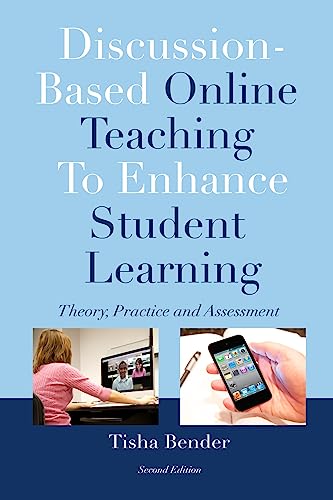Inhaltsangabe:
Book by Bender Tisha
Críticas:
"The new edition of Tisha Bender's book exceeds even the virtues of the first. She has made her work more timely than ever, with attention to current debates about cognition, reading, networked communications, and other features of life in the digital age. She also knows how today's online students think and behave, and what can be done to make them effective learners. But unlike others writing about online teaching and learning, Bender takes nothing for granted about the transformational features of the digital age for education. She believes in what's new, but makes the case for online pedagogical innovation reflecting thoughtful judgments about what the digital age means for students and instructors alike. This book offers a practical discourse of online course design framed by recognition of how the best teaching is also theoretical and critical. Much more than a simple 'how-to', this book offers a deep reading of a significant dimension of online teaching. Readers will learn how to be better online teachers and also better thinkers about what they do in the virtual classroom."-- (05/01/2012) "I've been teaching at Rutgers University since 1968 and Tisha Bender's wonderful little book served as the primer for designing my first online course two years ago. Now we have the second edition, even wiser and more useful than the first in a rapidly advancing field where even old dogs can learn new tricks. A must read for the novice deciding whether to go online, or forced to do so by circumstances, and a necessary reference guide throughout the semester when the unexpected starts happening. Bender's been there and she tells all."-- (04/01/2012) "I recommend this book to two audiences: to new online teachers who want to generate thoughtful discussion in their courses, and to experienced online instructors who have not been satisfied with the degree to which students in their courses engage each other about the material they are studying. In a chapter filled with imaginative strategies for learning in the online course, Bender describes how she and others have used debates, role playing in literary analysis, virtual field trips, guest 'lecturers', writing games, journals, team teaching and other innovations. It is a fascinating and highly creative chapter that will give the teacher new to online learning lots of fodder for designing their courses and thinking through activities that will challenge students to learn in different ways. Bender gives enough information so that a novice can borrow her ideas and put them into practice. She also outlines a number of strategies for using the synchronous online tools. She believes adamantly in the feasibility of human connection in a text-based online class in which no one knows what anyone else 'in class' looks or sounds like."--Online Cl@ssroom From reviews of the first edition: "An ideal book for teachers who are just making the transition from face-to-face to online teaching. As one new to online instruction, as well as hybrid teaching for the benefit of extended discussion and group work out side of class, I found Bender's book both informational and beneficial to the furtherance of my thinking about how to bring the best of my classroom teaching to this technological extension for learning in the global village....[I]...recommend Bender's book as an addition to the professional library of anyone hoping to implement (or improve) online discussion-based teaching and learning."--The American Journal of Distance Education
„Über diesen Titel“ kann sich auf eine andere Ausgabe dieses Titels beziehen.
![]()
